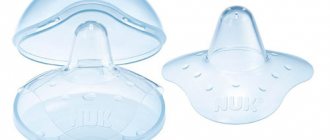Today is an unusual topic for conversation, let's talk about what many consider to be the negative sides of breastfeeding. Basically, very often you hear or receive information about the benefits of breastfeeding, but there are also moments when you can doubt whether breastfeeding is really as simple and cloudless as they write about it?
Most often, mothers talk about this among themselves and these are not always peaceful negotiations. Disagreements or even debates between them most often occur on forums where two warring halves argue fiercely: mothers of artificial children and mothers of infants. Each of them strives to prove that they are right: supporters of artificial feeding do not believe a single word of supporters of natural feeding, and they, in turn, cannot understand why their opponents do not accept obvious things. With all this, usually, mothers of artificial children recognize breastfeeding as the best and healthiest nutrition for the child, but completely reject other aspects of natural parenthood, such as: co-sleeping, carrying in their arms, feeding on demand, etc. Meanwhile, successful and long-term breastfeeding without these elements is extremely rare. So what exactly do these moms usually argue about?
You need to prepare psychologically for breastfeeding even before giving birth
What does it mean? This means that even before giving birth, the expectant mother must decide how she feels about breastfeeding, how important it is for her and her baby. To do this, she needs to make an informed decision, i.e. start looking for information on this topic.
I am sure that as soon as she receives more or less current and up-to-date information about the significance and value of natural feeding and analyzes it, her desire to breastfeed will become more conscious. And awareness of your own desires always leads to a search for means and ways to fulfill this desire and achieve your goals. This is how man is made. The desire to breastfeed is inherent in every woman, this is her destiny, but this desire is influenced, not in the best way, by many stereotypes that develop in society. I think it is absolutely accurate that a great many refusals to breastfeed are associated, first of all, with a lack of information, its accessibility, as well as with a violation of the continuity of generations.
Unfortunately, a lot of time has been lost in this regard; artificial nutrition has become too widespread over the past 100 years. The connection between the older generation and the younger generation has been lost, when breastfeeding was common in the family and young women learned the art of breastfeeding from their mothers and older sisters. Now, fortunately, the situation is beginning to change for the better, and this is good news.
During pregnancy, many expectant mothers spend a lot of time studying their condition, feelings, and caring for the baby, and this is good! But, often, they are not at all interested in breastfeeding, believing that everything will be fine. And after giving birth, they encounter difficulties that they did not suspect about.
I would like to encourage future mothers: My dear, good and smart mothers, read more about breastfeeding, watch videos, contact lactation specialists for prenatal consultation, not one of them will refuse to provide you with high-quality and reliable information about organizing breastfeeding! This will serve you well in the future and will give you confidence and peace of mind when your long-awaited baby is born!
Breast milk for a baby: composition, fat content
Breast milk is the best food for a newborn. What is his secret?
Every mother wants her child to grow up to be the smartest, most beautiful and healthy. Immunity and intelligence are contained in every drop of breast milk. The formula of breast milk is truly unique, and the benefits are invaluable.
Properties and importance of breast milk for a baby
Breast milk is the best food for a baby not only because it is best suited for his digestive system. It protects the baby from diseases and ensures his health for life.
Breastfed babies are less likely to suffer from rickets, anemia, dysbacteriosis, pneumonia, acute respiratory and other infectious diseases. They are less likely to suffer from allergies, diarrhea, and ear pain, and premature babies gain weight better. It has been proven that breastfeeding protects against obesity, allergies and bronchial asthma in the future. It includes hundreds of different components. The composition of breast milk is constantly changing. Colostrum is rich in protein and minerals. Mature milk does not contain much protein and much more fat, carbohydrates and other substances. The formula of this elixir is unique, nothing can replace it!
Water in breast milk
Surprisingly, about 87% of breast milk is water. It is biologically active and easily digestible, so the baby does not need to be specially supplemented with food.
Carbohydrates in breast milk
Carbohydrates in breast milk are lactose, or milk sugar. Under its influence, iron and calcium are absorbed, and the central nervous system is formed. Lactase promotes the growth of bifidum and lactobacilli.
Fats in breast milk
This is a building material that promotes the formation of membranes of all cells, the retina. To make it easier for the baby's immature body to absorb fats, a special enzyme is produced in breast milk - lipase. The highest concentration of fat is present in the milk that the baby sucks at the end of feeding.
That’s why it’s so important not to wean your baby prematurely.
Proteins in milk
Surprisingly, the protein component of breast milk is only 1%. And the more mature the mother’s milk, the less protein there is. If there was more of it, it would overload the kidneys and could disrupt the digestion process.
Vitamins and microelements in breast milk
Despite the small amount, all the nutrients in breast milk are easily absorbed by the baby's body. For example, iron is absorbed up to 70%! Therefore, breastfed children are less likely to suffer from anemia. In addition to iron, mother's milk contains calcium, potassium, sodium, zinc, phosphorus, and magnesium in sufficient quantities. Breast milk also contains amazing components such as hormones and substances that help fight infections and carry unique information about the mother's experience.
You will have to show strength of character and defend your opinion
As you know, many of the postulates of the older generation about baby care and breastfeeding are in many ways at odds with modern ideas about natural feeding.
| The older generation insists: | Modern approach to breastfeeding: |
| Separate sleep | Co-sleeping |
| Feeding according to the schedule | Feeding on demand, unlimited latches and unlimited sucking time. |
| Mandatory supplementation with water | A baby who is exclusively breastfed does not need additional water, provided there is a sufficient number of feedings. |
| Not hand trained | Carrying in the arms, frequent close bodily and tactile contact |
| Falling asleep on your own | Falling asleep under mother's breast. |
| Complementary foods should be introduced from 4 or even 3 months of life. | Any complementary foods are introduced no earlier than 6 months. |
As you can see, positions on many issues are often diametrically opposed. And the young mother needs to take this into account; she may have to prove to her mother or grandmother that you are doing everything right. There is no need to be afraid of this, you yourself are now a mother, you are responsible for your child and have the right to your own opinion. I suggest stocking up on the necessary sources of information in advance and gently offering to read them. Excerpts from the World Health Organization breastfeeding recommendations are best (see WHO recommendations). There will hardly be any objections to it. As well as authoritative articles with scientific research cited on why their advice is no longer relevant. I wish you fortitude!
Should I breastfeed my baby if there is an Rh conflict?
Due to Rh conflict, an infant may have an extremely difficult time accepting mother's milk.
This occurs due to the circulation of antibodies in milk, which negatively affect the child’s body.
Doctors sometimes warn about the possibility of such a problem even during pregnancy, but sometimes they forget about it...
For example, no one warned me about the possibility of this option. True, everything was fine with feedings.
Lucky. So don’t panic during pregnancy about Rh conflict.
You may be able to breastfeed your baby. A 100% indication for refusing breastfeeding is hemolytic disease.
Lactation can affect the well-being of a nursing mother
Hormonal changes in the body, the release of special lactation hormones and other hormones, such as prolactin, oxytocin, endorphin, can affect the following:
- Memory may deteriorate, a woman’s brain is concentrated on the child and under the influence of prolactin, everything else fades into the background, so it is better to stock up on a notebook;
- I often want to sleep, this is explained by the release of endorphin (the hormone of happiness), which relaxes the mother. Therefore, most mamusei inevitably fall asleep during feeding;
- A slight decrease in libido is explained by the suppression by prolactin of the female sex hormone estrogen and other hormones responsible for attraction to the opposite sex;
- Oxytocin can make you crave sweets and increases your thirst. Its active secretion can provoke attacks of short-term nausea.
I would like to emphasize that these changes in condition become acutely apparent, as a rule, during the period of lactation, when a storm of hormones rages in your blood, and this is the first few weeks after childbirth, then the situation stabilizes and the negative aspects are smoothed out.
Responsibility and ability to make decisions
In truth, responsibility for the baby and the ability to make decisions are necessary qualities for any mother, regardless of the type of feeding. But we're talking now, specifically from a breastfeeding perspective. During the entire long journey of lactation, the mother may have to face difficulties more than once and it is important to understand that only she is responsible and makes decisions regarding breastfeeding, the entire success of breastfeeding depends on her efforts and only she herself is able to solve the problems that arise. No matter how good a specialist or invited breastfeeding consultant may be, he will not be able to help you in any way if you yourself are unsure of success and doubt yourself.
The consultant can only share information, provide moral support, show and tell practical ways to solve the problem, but ultimately it all depends on the mother herself. Unfortunately, breastfeeding consultants are not given magic wands, and we don’t know any fairy spells to make all your problems go away at once (although it would be nice...). So, Mommy, have more confidence in your abilities, and I will try to help you not lose it!
Causes of IV in newborns
Often women unreasonably do not want to feed their child naturally, explaining this:
- the desire to get to work as soon as possible;
- fear of spoiling the shape of the breast;
- insufficient lactation.
Because of these prejudices, the baby is deprived of unique nutrition and runs the risk of encountering problems:
- digestion;
- weak immunity;
- allergies.
That is why there must always be a good reason for transferring a newborn to artificial feeding.
There are a number of circumstances when pediatricians consider it necessary to transfer a baby to special formulas:
- The child has diseases associated with metabolic disorders:
- phenylketonuria;
- galactosemia;
- celiac disease.
- Insufficient lactation in the mother or its complete absence.
- Taking medications by a nursing mother that are contraindicated during breastfeeding.
- Diseases in women that are incompatible with breastfeeding:
- HIV;
- purulent mastitis;
- hepatitis C and B;
- syphilis;
- mental disorders.
- Alcohol or drug addiction in the mother.
Very often, young mothers become wary when not enough milk is produced, especially in the first days of the child’s life.
Patience and work to enhance lactation are important here; you can also use special medications that establish normal milk production. If the measures taken do not help and the child suffers from insufficient nutrition and does not gain weight well, then it becomes necessary to introduce formulas
IMPORTANT! Any amount of breast milk will be beneficial for the baby; you should not deprive him of even a couple of drops of a natural product
Breastfeeding mothers often feel anxious
Yes, and there are many reasons for this. In the first place is the lack of milk. Most mothers have this point, even those whose milk flows like a river. The anxiety in the vast majority of cases is completely unfounded. The reasons for excessive worries are the lack of information and the mother’s lack of confidence in her own competence in matters of breastfeeding. The mother simply does not know how to determine whether the baby has enough milk, and the fear of leaving the baby hungry forces her to give formula “just in case.” But in fact, it is very easy to determine whether the baby has enough milk: urinary control and weight gain. ALL. No, of course, there is a real lack of milk; as a rule, this is a lactation crisis during a child’s growth spurt, but even here the mother’s calm and confidence plays a key role. Most often, anxiety states appear during lactation crises - approximately at 3, 5, 7 and 12 months of a child’s life, when the child’s energy expenditure increases, more milk is required, and the breasts do not immediately have time to “rebuild.” And again, knowledge of what to do in this case.
A nursing mother may also have fears regarding lactostasis and mastitis, and this fear forces the mother to constantly pump and does not allow her to relax and feed calmly.
Fears may be associated with pain in the nipples during feeding, although it no longer hurts, but the mother still wears nipple shields. There are many more reasons for concern, too many to list...
You can and should fight fears and anxiety! First of all, arm yourself with competent information, enlist the support of an experienced mother, a breastfeeding consultant, and everything will turn out to be not scary at all.
Understanding that you are making an amazing contribution to the health and future of your child, giving your dear baby a piece of yourself, you are inextricably linked with him, have an important mission, and nothing is more important for you right now will help you cope with anxiety and worries.
I'll have to change my role
Before the birth of a child, a woman could be anyone: a professional, a housewife, a wife, a businesswoman, etc. Now her whole being, first of all, is MOTHER - the source of food, comfort, peace of mind, life, in the end. And it can be difficult for some mothers to realize this. Breastfeeding, like no other process, helps you accept and feel the joy of motherhood. The closeness of your dear baby during feeding helps you quickly get used to the new role, helps you better understand your child, and teaches you to be a mother in the best sense of the word.
The subject of concern for many mothers is breast and body shape.
There is probably no young mother who would not care about her own appearance. And I am often asked the question, how does breastfeeding affect the shape of the body and breasts. Indeed, body weight after childbirth and during lactation may decrease slowly. The body is not inclined to lose weight, especially in the first months after childbirth, when it needs a certain strategic reserve for lactation. And it is not advisable for a nursing mother to go on a diet, as this affects the composition of the milk and may not have a very good effect on the baby. But an active lifestyle (walking, preferably with a sling, moderate physical activity), adequate nutrition (not for two), a balanced diet enriched with vegetables, excluding large amounts of baked goods, fried foods, and excessively fatty foods will help keep you in shape. If a mother follows these simple tips, then usually, by the baby's year, the mother returns to her pre-pregnancy weight. You just need to take into account that the mother gained weight over the course of 9 months and it will take about the same amount of time, without harm to the health of her and the child, for it to gradually decrease.
As for the shape of the breast, the trick is that the shape of the breast changes under the influence of hormones, even during pregnancy, and breastfeeding has practically nothing to do with it. Those. No matter how you feed your baby, your breasts will change their shape. C'est la vie... What else can affect the shape of the breast?
- Unreasonable breast pumping, for example, after feeding (the old fashioned way);
- Breast tightening during weaning;
- Incorrect application;
- Dramatic weight loss;
- Strong weight gain when eating “for two”;
- Feeding from one breast (how to breastfeed correctly).
The natural cessation of lactation affects the shape of the breast in the best possible way, when it fades away gradually, and not forcibly, in this case, the breast returns to its pre-pregnancy shape.
Breastfeeding can be accompanied by inconveniences, namely:
- Feeding, regardless of the time of day.
- Co-sleeping (although in fact this is a plus, even inveterate opponents of co-sleeping often change their minds)
- If necessary, you will sometimes have to pump (usually not required)
- You cannot leave a child until 6 months, or maybe more, with grandmothers or father for a long time.
- You can't sleep on your stomach for a long time.
- You will have to somewhat limit yourself in eating harmful goodies, drinking alcohol and smoking (it’s better for you).
Disadvantages of Breastfeeding
Despite the high popularity of breastfeeding, many young mothers prefer artificial formula. They oppose the main ideas of this natural process.
- Long-term breastfeeding. Many people feed the baby only for a short time after giving birth, after which, for various reasons, they try to stop this process ahead of time.
- I sleep with the baby. This often causes inconvenience for new parents.
- Feeding on demand. Mom should always be close to the baby.
The lack of breast milk for a baby is fraught with decreased immunity, slowed intellectual development, as well as a loss of connection between the child and mother. But with all this, breastfeeding is not a panacea and the only right solution. After all, it is associated with various difficulties and problems for women.
Psychological preparation
It is important that the young mother herself wants to feed her baby. Before giving birth, she must tune in to this emotionally, and also study information related to this issue. After all, this process does not always happen correctly on its own. All lactation disorders should be taken calmly and consult with specialists in a timely manner.
Solid character
Doctors often differ in their opinions: is it so important to breastfeed a child at all costs? Breastfeeding has opponents and supporters both among relatives and among doctors. Therefore, a young mother must defend her own decision on this issue, despite pressure from others. But it is still necessary to listen to the opinion of experts. Each woman must decide for herself whether she will breastfeed her baby or give preference to formula. In addition, there are situations when using a mixture is indispensable.
Bad feeling
You need to be prepared for the fact that hormonal levels will be disrupted during this period. Therefore, a woman’s well-being can often deteriorate.
- Since feeding releases endorphins, drowsiness may occur.
- Prolactin increases during this period, as a result of which the woman concentrates her attention only on the baby, and it is much more difficult for her to concentrate on other things.
- Prolactin also suppresses estrogen production. But attraction to a sexual partner and the regularity of the menstrual cycle depend on it. This is how the body rests after pregnancy.
- Under the influence of the hormone oxytocin, thirst, nausea or strong cravings for sweets develop.
Responsibility for decision making
Young parents must understand that they are now fully responsible for their baby. All their decisions must be serious and thoughtful. Therefore, it is important to contact breastfeeding consultants and other specialists. All issues related to the baby should be discussed with doctors, psychologists and other professionals. In addition, you need to look for information about the development and upbringing of a child on your own. It is important to remember that the future life and health of the baby depends on your actions.
After all, no one will take care of your baby as well as you yourself. This applies not only to breastfeeding, but also to all other issues related to caring for the baby.
State of anxiety
Young mothers often cannot cope with anxiety. They worry about any reason and any disturbance in feeding. The most vivid experiences occur during the lactation crisis. This happens 3, 5, 7, and also a year after birth. The child grows and needs more and more milk, but the body does not have time to rebuild.
A young mother also has other fears associated with stagnation of milk, pain or the use of pads.
In order for milk to be produced in normal quantities, the mother must be sure that this will happen. The mother becomes calm and confident when the baby steadily gains weight and “goes to the toilet” normally. A woman must believe that nature will help her feed the baby for a sufficient amount of time.
Breast milk is simply the ideal food for your baby after birth and for the next few years. During this period, problems and difficulties cannot be avoided. But in return, the mother receives confidence that she has done everything possible for the normal development and preservation of the baby’s health.
Social roles
Before giving birth, the woman managed to try on different roles. This is a beloved woman, a good employee at work, and a wife - the keeper of the hearth. After giving birth, she also becomes a mother, as well as a nurse for the baby.
It is important that the woman understands that this is a natural, normal process, and does not feel like a simple source of food for the child.
After all, nature conceived feeding so that the child could adapt to life in the new world. A child who feeds on mother's milk will feel confident and calm. It will be easier for mom to establish contact with him. She will be able to psychologically get used to the new role.
Figure and breast shape
During pregnancy, women often gain weight. If after giving birth a young mother chooses to breastfeed, it will be very difficult to get rid of this weight. The reason may not be breastfeeding itself, but the fact that the mother begins to eat very intensively, experiencing a beastly appetite.
The body begins to store energy in order to ensure the normal feeding process. Six months after giving birth, the body uses fat reserves in order to produce enough milk. The woman's excess weight gradually disappears. To do this, you don’t even need to change your diet or exercise.
The shape of the breast also changes. But the reason is not in feeding, but in pregnancy itself, as well as heredity. Even those young mothers who did not breastfeed their baby at all are often unhappy that after childbirth the shape of their breasts has changed.
If a woman constantly expresses milk, begins to eat uncontrollably as a result of an increase in appetite, and her weight fluctuates, this leads to much greater consequences for the shape of her breasts. In addition, poor nutrition of the baby, breast bandaging and other factors also have a negative impact. It is very important to stop feeding not abruptly, but gradually. Only in this case will the breasts return to their pre-pregnancy shape.
Various inconveniences
There are other inconveniences that a young mother faces when she decides to feed her baby naturally. But in order to keep the baby healthy, you can put up with them.
- It is important to understand that the baby will have to be fed throughout the day. Feeding will occur not only during the day, but also at night.
- Young parents will have to sleep together with the baby. This can cause them problems and discomfort. It is important that the young father understands this need. He must support his wife morally in order to maintain her psychological comfort. But this is one of the keys to normal lactation.
- Sometimes milk leaks, which can also cause discomfort for a woman.
- Sometimes milk will have to be expressed.
- Every young mother should know that sleeping on her stomach is prohibited during the feeding period. This can lead to unpleasant consequences.
- A baby who is not yet 6 months old should not be left with relatives for a long time. Mom should always be there.
- During this period, the woman will have to completely give up smoking and drinking alcohol. After all, all toxic substances will penetrate into the milk. They have a much more detrimental effect on a child’s body than on the health of an adult. Therefore, a woman must be aware of her full responsibility for the health of the child.
- A woman who is breastfeeding should be very careful about her diet. There are many restrictions during this period that you should familiarize yourself with in advance. It is important to understand that substances from food also pass into milk. The baby’s body is still far from able to digest and perceive everything. He may develop allergies to many substances. A young mother should consult a doctor on this issue, and also independently study information related to nutrition during lactation.
Positive attitude
During the breastfeeding period, a woman should try to maintain a good attitude. Firstly, this is a prerequisite for producing a normal amount of milk. Secondly, the child always feels the psychological state of the mother acutely and reacts to it accordingly. A nervous mother will have a nervous baby, and lactation will be difficult.
A happy woman will be able to feed her child normally, raise him joyful and contented, and will also be able to maintain normal relationships with her husband and family.
It is necessary to listen to all advice and recommendations received from doctors, relatives or read in books and magazines. But don't worry or worry too much about it. This will only worsen the situation and weaken lactation. It is better not to listen to unpleasant comments and frightening stories. It is important to understand that feeding the baby is a natural process, and all fears and anxieties will go away.











